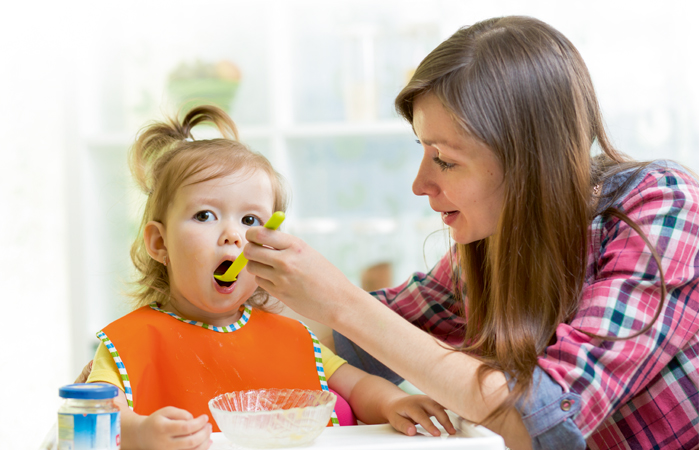Weaning

Ask the experts: weaning
In Weaning
Bookmark
Record learning outcomes
Weaning can be a challenging process for parents who want to ensure their toddler is getting the best nutrition. Here’s how our experts would answer these common weaning queries

Q: What are the signs that a baby is not getting the right diet or enough to eat while they are weaning?
A: â€A weaning baby who is not getting enough solid foods will probably increase their milk intake and may be slow to gain weight,†says Sara Patience, health visitor and registered nutritionist specialising in child nutrition. “A baby should eat a varied range of healthy foods: vegetables and fruit, starchy foods such as potato, pasta or rice, meat, fish or non-meat proteins, and dairy foods along with their usual milk, from six months. Damage to teeth through high sugar intake, problems with high or slow weight gain or bowel problems should prompt a discussion with a healthcare professional.â€
Q: Why is it best to start the weaning process with vegetables?
A: "Vegetables are great sources of nutrients and are easy, safe foods to offer to babies as their first foods. They are cheap, easy to prepare and also very versatile as they can be mashed, puréed or offered as soft finger foods,†says registered nutritionist Charlotte Stirling-Reed, BSc (Hons) MSc. “As babies are born with a preference for sweet foods, they don’t often need encouragement to enjoy eating fruit. However, vegetables have a variety of different tastes – some bitter, some sour – so it is a good idea to start getting baby used to these different flavours right away. Familiarity is key to babies’ acceptance of new foods, so it’s important to encourage parents to continue offering a variety of different tastes, textures and flavours to baby during complementary feeding.â€
Q: What foods should not be given to a baby during the weaning process?
A: Boots UK nutritionist Vicky Pennington says that babies should not be given:
- Before six months: cows’ milk, eggs, wheat, gluten, nuts, peanuts, seeds, fish, shellfish, liver, soft or unpasteurised cheese
- Added sugar, salt or stock cubes
- Honey before one year of age
- Whole nuts until the age of five
- Raw or undercooked eggs
- Low fat or low calorie foods
- Too many high fibre foods, or foods with added bran, which fill a baby up.Also too much fibre interferes with absorption of important minerals such as iron
- Shark, swordfish, marlin (the mercury in them can affect the nervous system) or raw shellfish
- Tea, coffee, fizzy drinks or squash.
Q: When a baby starts eating solids, how will his bowel movements change? What are the signs that something might be wrong?
A: “The stools tend to get firmer and darker and may become less frequent. The appearance of the stools will depend on what has been eaten,†explains freelance paediatric dietitian Tanya Thomas, BSc (Hons) RD. “Signs that something is wrong may be straining, pain, infrequency or difficulty passing a stool. These may indicate constipation, which can occur at weaning with the change in solid intake. If stools are very loose or frequent, this may indicate an intolerance to some part of the weaning diet.â€
Â
Read all the articles in this section? Now test your knowledge and add this to your learning log.
